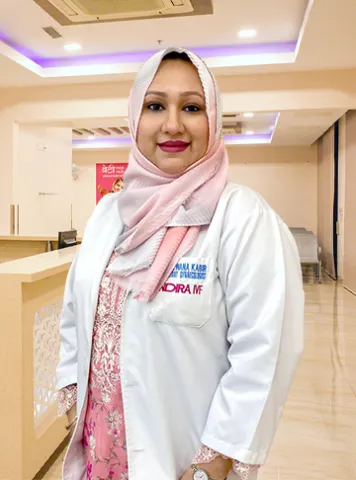What Happens in IVF?
In Vitro Fertilisation, or IVF, is a widely used reproductive therapy that involves fertilising eggs with sperm in a lab test tube. This begins with ovarian stimulation, in which hormones cause the ovaries to produce many eggs instead of the one egg that would typically be generated during a natural cycle. After the eggs are mature, they are taken out with the help of a minor surgical procedure. These eggs are then pooled together with the sperm under controlled conditions so as to enable fertilisation.
Following fertilisation, the embryos thus formed are carefully monitored over a number of days in order to determine their growth and quality. The embryos are transferred into the uterus of the woman, where the healthiest embryos are implanted to form a pregnancy. The IVF process normally requires a period of about three weeks, though this process can be extended according to the cases of the patient, or the embryo freezing or any other genetic testing. Let’s understand it in detail through IVF treatment stages.
Stages of IVF
Stage 1: Ovarian Stimulation and Monitoring
The IVF journey often starts with ovarian stimulation. In this phase, medications are given to the woman to stimulate the ovaries in order to produce a large number of eggs. During this stage, you will be checked frequently by an ultrasound and blood tests to evaluate the ovarian reaction and, if needed, to change the medication dosage. This part is very important as the quality and quantity of eggs to a large extent determine the success rate of IVF.
Stage 2: Egg Retrieval
The next step in the IVF cycle stages happens after the ovarian follicles have matured. This step is egg retrieval. In order to make you comfortable, this minor surgery is done under sedation or anaesthesia. Laser and ultrasound are used to collect the woman’s eggs. Mild pain or bloating caused by egg retrieval is normal, but the discomfort usually goes away in a few days. The procedure is often done with ease and involves a very short waiting time for the recovery phase.
Stage 3: Sperm Collection
Simultaneously with the egg retrieval procedure, the male partner is asked to provide a sperm sample, which will be used for fertilisation. If the problem lies in sperm production or quality, sperm retrieval methods like Testicular Sperm Aspiration (TESA) could be the solution. These operations make it possible for the removal of sperm directly from the testes or epididymis for fertilisation. Sperm collection or retrieval is usually coordinated with the time of egg retrieval.
Stage 4: Fertilisation and Embryo Development
The sperm and eggs are combined in a laboratory to facilitate fertilisation by artificial insemination. The fertilised eggs are taken out of the body and incubated for a few days until the cells start dividing to form embryos. Embryologists watch embryo formation very closely in order to pick out the fittest. Sometimes, embryos can be screened for genetic abnormalities before they are implanted. At this stage, the entire IVF procedure blends with nature, and the application of science to life-creation is accomplished.
Stage 5: Embryo Transfer and Pregnancy Test
The final stage of the IVF process is embryo transfer. This process means one or more embryos are put into the womb in order to attach to it and hopefully develop into a pregnancy. The embryo transfer is a fairly easy operation and does not require anaesthesia. This operation is quick and simple, which usually takes only a few minutes. Following the surgery, it is advised that the patient relax and adhere to the doctor's recommendations. A blood test about two weeks after the embryo transfer is made to reveal if the IVF method has been successful and the woman is pregnant or not.
Preparing Your Body for IVF
One vital preparatory step that will increase your chances of success in the in vitro fertilisation (IVF) process is preparing your body. Practising healthy lifestyles will have a positive impact on fertility and reproductive health in general.
- Maintain a Balanced Diet: The goal of the diet should be to support hormonal balance and reproductive health. The diet should include fresh fruits, vegetables, whole grains, omega-3 fatty acids, vitamins, and minerals to keep your body in peak condition.
- Limit Alcohol Intake: Alcohol might not only kill the embryo but also lower the rate of success of IVF. The best thing you can do for yourself is to stop drinking when you are preparing for and during IVF cycles.
- Reduce Caffeine Consumption: Overconsumption of caffeine might lead to a higher risk of miscarriage and lower the chances of IVF success. Cutting down on coffee, tea, and energy drink consumption will be a great move to achieve better results.
- Exercise Moderately: Light to moderate exercises such as walking, yoga, or swimming have been found to be helpful in stress management, hormone regulation, and good blood circulation - all of which are good for IVF preparation.
- Prioritise Sleep Quality: Popular sleep contributes to the emission of reproductive hormones and reduces stress. Wherever possible, a restful sleep should be promoted to give way to a healthy environment.
- Avoid Tobacco and Harmful Chemicals: Tobacco smoke and other pollutants in your surroundings may decrease your fertility to a large extent. Getting rid of these bad habits not only helps you to keep your reproductive fluids healthy but also increases your chances of getting pregnant by IVF.
What Are the Common Side Effects of IVF?
During ovulation stimulation, some individuals may experience:
- Nausea or vomiting
- Hot flashes
- Headaches
- Enlarged ovaries, causing discomfort
- Abdominal pain
- Bruising at injection sites
After embryo transfer, side effects may include:
- Constipation
- Bloating and cramping
- Breast tenderness due to high oestrogen
- Light spotting
If we take a look beyond the physical, IVF can take a toll emotionally. The emotions of anxiety, disappointment, or even depression can be quite common. Communicating your worries to the doctor frankly will not only grant you the emotional support that you need but also the right medical help during the treatment.
Life After IVF: Recovery and Expectations
The recovery process from IVF is mixed with emotional and physical aspects. The woman may experience some cramping, flatulence, or a brief period of tiredness, which are all normal and typically resolve within a couple of days. Regular check-ups are essential to ensure everything is functioning correctly.
On the emotional side, the waiting period between the embryo transfer and the pregnancy test can be very nerve-wracking. The feeling of anxiety, hope, or disappointment at this stage is nothing unusual. Comfort derived from family, therapy, or support groups can make the path less rough for patients. No two IVF journeys are the same, and concentrating on one's wellness can result in easier recovery.
Conclusion
It is true that the very first step towards IVF is often felt like a mountain too high to climb; however, with expert advice, the trip becomes a lot calmer. The fertility specialists are always available to clarify your doubts, review IVF process step by step, and provide assistance during your tour.
Book an appointment with Indira IVF if you want to discuss your fertility options, have the IVF stages explained, and get the unique care that has been designed just for you.
Frequently Asked Questions
How many stages are there in IVF?
Is IVF painful?
How long does an IVF cycle take?
What are the chances of IVF working the first time?
Can lifestyle affect IVF success?
Meet Top Fertility Specialists in Bangladesh at Indira IVF

Dr. Umme Ruman
Chief Infertility Specialist, MBBS(DU), FCPS(Obstetrics and Gynaecology), Fellowship in Assisted reproduction
Dr. Umme Ruman is a BMDC-registered infertility specialist based in Dhaka. She holds advanced qualifications in assisted reproductive techniques, sexual and reproductive medicine. Dr. Ruman serves as a Chief Consultant at Indira IVF Dhaka, helping patients with personalised fertility care based on her vast experience and expertise. Her knowledge and compassion will support couples navigating reproductive health challenges and guide them effectively towards their parenthood dreams.

Dr. Rezwana Kabir
IVF specialist, MBBS (SSMC), MS (Obstetrics and Gynaecology), Fellowship in Assisted reproduction
Dr. Rezwana Kabir is a BMDC-registered specialist in obstetrics and gynaecology, and now a part of Indira IVF’s team of fertility specialists in Bangladesh. She combines medical proficiency with a patient-centric approach, offering tailored solutions to couples seeking fertility assistance. She is committed to helping individuals confidently navigate the journey to parenthood through ethical, empathetic, and evidence-based care.
.


